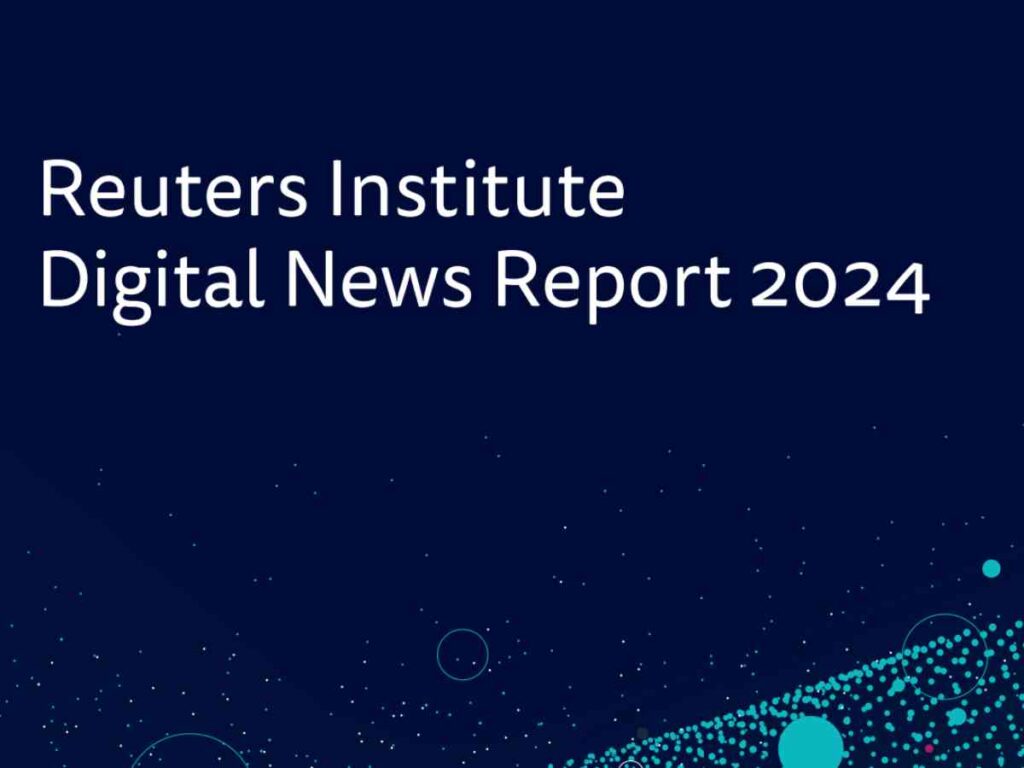The Reuters Institute’s Digital News Report 2024 offers a comprehensive analysis of the shifting dynamics in the global news industry
Nilambar Rath

The Reuters Institute’s Digital News Report 2024 unveils groundbreaking insights into global online news consumption, based on an extensive YouGov survey of over 95,000 individuals across 47 countries, representing approximately half of the world’s population.
This year’s report delves into the escalating significance of social media platforms in shaping news consumption and production, with a focus on visually-driven and video-centric platforms like TikTok, Instagram, and YouTube.
Additionally, the report examines audience perspectives on the integration of Artificial Intelligence (AI) in news, the emerging role of creators and news influencers, news payment habits, and other pivotal trends transforming the digital news landscape.
As digital and social media continue to transform the way news is consumed and disseminated, it’s essential to understand the current trends, audience behavior, and the role of various platforms in engaging news audiences. The report highlights the growing dominance of digital media, with online news sources surpassing traditional platforms like newspapers, radio, and TV. Social media platforms, in particular, have become crucial channels for news dissemination, with X (formerly Twitter), Facebook, YouTube, and Instagram leading the way.
Video content has emerged as a key driver of news engagement, with many news organizations investing heavily in video production. The report notes that video news is becoming increasingly popular, especially among younger audiences.
Globally, trust in news is a concern, with many audiences expressing skepticism about the accuracy and reliability of news sources. However, there are variations across markets, with some regions showing higher trust levels than others.
Websites, social media pages, and content aggregation platforms are experiencing varying levels of audience engagement. While some platforms are seeing significant growth, others are struggling to maintain user interest.
In terms of demography, the report reveals that men and women have distinct news consumption habits. In most markets, men tend to dominate news audiences, but there are notable exceptions.
What kind of content the readers and viewers are looking for today? The report highlights that, audiences crave in-depth analysis, investigative reporting, and diverse perspectives. They want news that helps them understand complex issues, with 62% seeking news that provides context and explanation. Additionally, 55% of respondents prefer news that offers new insights and perspectives.
The report also flags the growing influence of news influencers, particularly among younger audiences. These individuals, often with large social media followings, provide commentary and analysis on current events. In some markets, like South Korea and Brazil, news influencers have become essential sources of news and information. However, their rise also raises concerns about the blurring of lines between journalism and opinion-driven content.
Overall, the Digital News Report 2024 underscores the evolving nature of digital news consumption, with audiences seeking high-quality, in-depth content and willing to pay for it. The rise of news influencers presents both opportunities and challenges for traditional news organizations, as they navigate this shifting landscape.
The report reveals that audiences are increasingly willing to pay for news, with 17% of global survey respondents paying for online news, up from 10% in 2016. However, this trend varies across countries and regions. In Norway, 34% of respondents pay for news, while in the United States, only 16% do. Notably, countries with strong public service broadcasting traditions, like the UK and Germany, show lower willingness to pay.
The report touches on critical issues affecting the news industry, including:
- Misinformation: The spread of false information on social media platforms remains a significant concern.
- Independent Journalism: The importance of independent journalism is underscored, amidst concerns about political interference and corporatization of news organizations.
- Political Interference: The report highlights instances of political interference in newsrooms, compromising editorial independence.
- Corporatization: The increasing influence of corporate interests on news organizations raises concerns about the integrity of journalism.
The Digital News Report 2024, an annual report card prepared by Reuters Institute in collaboration with University of OXFORD and Google News Initiative, offers valuable insights into the evolving media landscape.
In the foreword, Professor Rasmus Kleis Nielsen, Director, Reuters Institute for the Study of Journalism (RISJ) highlights, “This year’s Reuters Institute Digital News Report documents the scale and scope of ongoing ‘platform resets’ where – even before new advances in generative artificial intelligence further change the information ecosystem – the environment for publishers and others who want to connect with the public is undergoing substantial change.”
“Legacy social media such as Facebook and X are actively reducing the prominence and role of news on their platforms, and moving further away from a reliance on links driving referrals to publishers, even as increasingly popular platforms of different kinds are growing more important, also for how many people access, find, share, and experience news. Visual and video-led platforms including TikTok, Instagram, and YouTube are all growing in importance, and WhatsApp, with very different forms of discovery and distribution, plays a major role in many countries,” adds Professor Nielsen.
The report highlights in the executive summary, “Although the platform mix is shifting, the majority continue to identify platforms including social media, search, or aggregators as their main gateway to online news. Across markets, only around a fifth of respondents (22%) identify news websites or apps as their main source of online news – that’s down 10 percentage points on 2018. Publishers in a few Northern European markets have managed to buck this trend, but younger groups everywhere are showing a weaker connection with news brands than they did in the past.
“Turning to the sources that people pay most attention to when it comes to news on various platforms, we find an increasing focus on partisan commentators, influencers, and young news creators, especially on YouTube and TikTok. But in social networks such as Facebook and X, traditional news brands and journalists still tend to play a prominent role.
“Concern about what is real and what is fake on the internet when it comes to online news has risen by 3 percentage points in the last year with around six in ten (59%) saying they are concerned. The figure is considerably higher in South Africa (81%) and the United States (72%), both countries that have been holding elections this year.
“Worries about how to distinguish between trustworthy and untrustworthy content in online platforms is highest for TikTok and X when compared with other online networks. Both platforms have hosted misinformation or conspiracies around stories such as the war in Gaza, and the Princess of Wales’s health, as well as so-called ‘deep fake’ pictures and videos.”
As digital and social media continue to shape the news industry, it’s essential for news organizations to adapt and innovate to meet the changing needs of their audiences. By understanding these trends and challenges, media professionals, academicians, and students can better navigate the complex world of digital news.
(The author is a senior journalist and communication specialist. Views expressed are personal.)
#DigitalNewsReport2024 #ReutersInstitute #News


























Well narrated. I enjoyed sustaining my interest while reading your article. When we navigate the media ecosystem, the lack of accountability or the overt compromises to the integrity of the writers/publishers do disturb us. We need to bear with the disagreeable realities of life.
Allow the stoical punctuation. The article is worth reading. Thanks Mr Rath.
Sorry, there is an error.
Should be ‘we feel disturbed ” rather than ‘do disturb us ”
Regret the inadvertent mistake